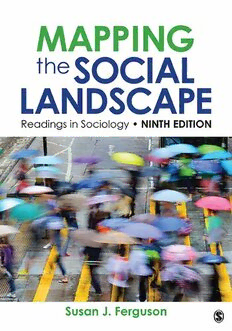
Mapping the Social Landscape: Readings in Sociology PDF
Preview Mapping the Social Landscape: Readings in Sociology
Mapping the Social Landscape Ninth Edition With love to my grandmother, Edna Catherine Clark, who always believed that an education would open the doors of the world to me. She was right. Sara Miller McCune founded SAGE Publishing in 1965 to support the dissemination of usable knowledge and educate a global community. SAGE publishes more than 1000 journals and over 800 new books each year, spanning a wide range of subject areas. Our growing selection of library products includes archives, data, case studies and video. SAGE remains majority owned by our founder and after her lifetime will become owned by a charitable trust that secures the company’s continued independence. Los Angeles | London | New Delhi | Singapore | Washington DC | Melbourne Mapping the Social Landscape Readings in Sociology Ninth Edition Susan J. Ferguson Grinnell College FOR INFORMATION: Copyright © 2021 by SAGE Publications, Inc. SAGE Publications, Inc. All rights reserved. Except as permitted by U.S. 2455 Teller Road copyright law, no part of this work may be reproduced Thousand Oaks, California 91320 or distributed in any form or by any means, or stored in E-mail: [email protected] a database or retrieval system, without permission in writing from the publisher. SAGE Publications Ltd. 1 Oliver’s Yard All third party trademarks referenced or depicted herein 55 City Road are included solely for the purpose of illustration and are London, EC1Y 1SP the property of their respective owners. Reference to United Kingdom these trademarks in no way indicates any relationship with, or endorsement by, the trademark owner. SAGE Publications India Pvt. Ltd. B 1/I 1 Mohan Cooperative Printed in the United States of America Industrial Area Library of Congress Control Number (LCCN): 2020941903 Mathura Road, New Delhi 110 044 India ISBN 978-1-5443-3466-0 SAGE Publications Asia-Pacific Pte. Ltd. 18 Cross Street #10-10/11/12 China Square Central Singapore 048423 This book is printed on acid-free paper. Acquisitions Editor: Jeff Lasser Editorial Assistant: Tiara Beatty Production Editor: Rebecca Lee Typesetter: Hurix Digital Proofreader: Wendy Jo Dymond Cover Designer: Candice Harman Marketing Manager: Rob Bloom 20 21 22 23 24 10 9 8 7 6 5 4 3 2 1 CONTENTS Preface xiv Changes to the Ninth Edition xv Supplemental Learning Materials xvi Acknowledgments xvi About the Editor xix PART I • THE SOCIOLOGICAL PERSPECTIVE 1. The Promise 1 C. Wright Mills —classic piece on the sociological imagination 2. T eenage Wasteland: Suburbia’s Dead-End Kids 7 Donna Gaines —applying the sociological imagination to teen suicide 3. A n Intersection of Biography and History: My Intellectual Journey 18 Mary Romero —applying the sociological imagination to domestic service Theory 4. T heoretical Perspectives in Sociology 31 Chris Hunter and Kent McClelland —an introduction to the primary theories used in sociology 5. M anifesto of the Communist Party 40 Karl Marx and Friedrich Engels —classic piece on the relationship between the capitalists and the workers 6. O n Being Sane in Insane Places 45 David L. Rosenhan —classic piece on labeling and social deviance Social Research 7. F inding Out How the Social World Works 56 Michael Schwalbe —summary of what it means to be sociologically mindful 8. I nterpersonal Dynamics in a Simulated Prison 65 Craig Haney, W. Curtis Banks, and Philip G. Zimbardo —classic piece on the research design of Zimbardo’s famous experiment 9. W orking at Bazooms: The Intersection of Power, Gender, and Sexuality 75 Meika Loe —an investigation of gender, sexuality, and power in the work place PART II • CULTURE 10. C ulture: A Sociological View 89 Howard S. Becker — classic piece that provides a theory of culture 11. R aising Global Children Across the Pacific 99 Pei-Chia Lan —how Taiwanese and Taiwanese American parents negotiate cultural boundaries for their children 12. L ovely Hula Hands: Corporate Tourism and the Prostitution of Hawaiian Culture 106 Haunani-Kay Trask —an examination of cultural commodification and exploitation PART III • SOCIALIZATION 13. “ No Way My Boys Are Going to Be Like That!”: Parents’ Responses to Children’s Gender Nonconformity 113 Emily W. Kane —how parents socialize children to gender norms 14. U sing Racial and Ethnic Concepts: The Critical Case of Very Young Children 125 Debra Van Ausdale and Joe R. Feagin —a study of preschool children’s understandings of race and ethnicity 15. M aking It By Faking It: Working-Class Students in an Elite Academic Environment 136 Robert Granfield —working-class identity and law school socialization 16. A nybody’s Son Will Do 148 Gwynne Dyer —resocialization into the total institution of the military PART IV • GROUPS AND SOCIAL STRUCTURE 17. T he Birth of the Intravidual 158 Dalton Conley —an analysis of the individual and groups in society 18. P eer Power: Clique Dynamics among School Children 167 Patricia A. Adler and Peter Adler —a study of the structure and interactional dynamics among school children’s groups 19. S hopping as Symbolic Interaction: Race, Class, and Gender in the Toy Store 182 Christine L. Williams —an example of secondary group relationships and interaction PART V • DEVIANCE, CRIME, AND SOCIAL CONTROL 20 F rom Nowhere: Space, Race, and Time in How Young Minority Men Understand Encounters with Gangs 192 Randol Contreras —how Black and Latino men make sense of gang encounters 21. F raternities and Collegiate Rape Culture: Why Are Some Fraternities More Dangerous Places for Women? 206 A. Ayres Boswell and Joan Z. Spade —the social organization of crime 22. D escent into Madness: The New Mexico State Prison Riot 218 Mark Colvin —an example of social structure breaking down PART VI • SOCIAL INEQUALITY Social Class 23. S ome Principles of Stratification 231 Kingsley Davis and Wilbert E. Moore —classic piece on the functions of social stratification 24. W ho Rules America?: The Corporate Community and the Upper Class 241 G. William Domhoff —the lifestyles and social institutions of the upper class
